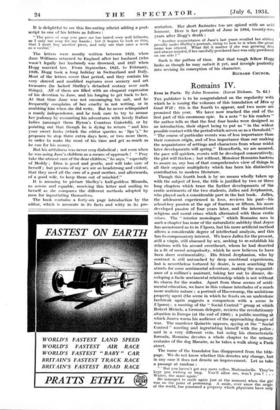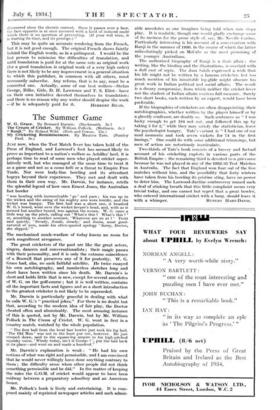Romains IV.
which he is issuing the volumes of this translation of Men of Good Will ; this is the fourth to appear, and two more are promised this year. We have now reached the end of the first part of this enormous epic. In a note " to his readers " the author tells us that the first four books were designed as an introduction, their object being to put us " in the widest possible contact with the period which serves us as a threshold." " The course of particular events was of less importance than their common origin, and of less importance than our making the acquaintance of settings and characters from whose midst later developments will spring." Henceforth, we are assured, the pace will quicken, events will be developed consecutively, the plot will thicken ; but without, Monsieur Romains hastens to assure us, any loss of that comprehensive view of things in all their organic multiplicity which has been his distinctive contribution to modern literature.
Though this fourth book is by no means wholly taken up with the subject of love, the title is justified by two or three long chapters which trace the further developments of the erotic sentiments of the two students, Jallez and Jerphanion, who played such a considerable part in the last book.. Jailer, the adolescent experienced in love, reviews his past—his school-boy passion at the age of fourteen or fifteen, his more developed passion of four years later, and the intermittent religious and moral crises which alternated with these erotic crises. The " interior monologue ". which Romains uses in suchn chapter has none of the naturalistic subtlety that Joyce has accustomed us to in Ulysses, but his more artificial method allows a considerable degree of intellectual analysis, and this has its compensatory interest. We leave Jallez for the present, still a virgin, still obsessed by sex, seeking to re-establish his relations with his second sweetheart, whom he had deserted in a fit of moral scrupulosity, which he now believes to have been sheer sentimentality. His friend Jerphanion, who by contrast is still untouched by deep emotional experiences, but is nevertheless tortured by desire, is seen searching the streets for some sentimental adventure, making the acquaint- ance of a milliner's assistant, taking her out to dinner, de- .veloping a facile sentimental relationship which is not without
its charm for the reader. Apart from these scenes of senti- mental education, we have in this volume interludes of a much more realistic nature : a portrait of Havercamp, the ambitious ,property agent (the scene in which he feasts on an underdone :beefsteak again suggests a comparison with a scene in Ulysses); a meeting of the " Social‘Control " group at which
:Robert Michels, a German.delegate, reviews the revolutionary situation in Europe (at the end of 1908) ; a public meeting at :which Jaures warns his audience of the approaching danger of . war. The murderer Quinette appears, spying at the " Social Control" meeting and ingratiating himself with the police; and in a very different vein, but using his characteristic formula, Romains devotes a whole chapter to the urinary ecstasies of the dog Macaire, as he takes a walk along a Paris street.
The name of the translator has disappeared from the title- page. We do not know whether this denotes any change, but in any case it does not denote an improvement. Let us take a passage at random : " But you haven't got any more coffee, Mademoiselle. They've kept you waiting so long. You'll allow me, won't you ? . . . Waiter, the same again.' He managed to smile again just at the moment when the girl was on the point of protesting. A smile, ever since the origin of the world, has possessed a property which physicists have only discovered since the electric current. Once it passes over a face, the face opposite is at once invested with a kind of induced smile which there is no question of preventing. (If your will tries, it is wasting its time, and its prestige.) "
This may be quite an accurate rendering from the French, but it is not good enough. The original French shows faintly behind the English words, as in a palimpsest. I would be the last person to minimize the difficulties of translation, and until translation is paid for at the same rate as original work
(for a good translation is original work of a very high order) there is not likely to be any improvement in a general situation
to which this publisher, in common with all others, must necessarily subscribe. Any reform, that is to say, must be a concerted one. Actually, some of our best writers—Stefan George, Rilke, Gide, D. H. Lawrence and T. S. Eliot—have on their own initiative devoted themselves to translation : and there is no reason why any writer should despise the work
—if he is adequately paid for it. HERBERT READ.











































 Previous page
Previous page